
By Shannon Lukens.
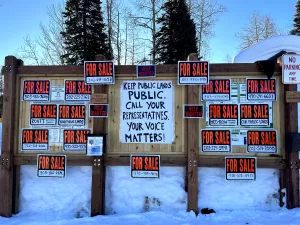
The Routt County Commissioners have sent a letter to the Senate Energy and Natural Resources Committee. It’s about their strong opposition to the “Lee Amendment,” which is part of what is being called the “One Big Beautiful Bill Act,” which says land in the National Forest System and Bureau of Land Management could be sold for affordable housing. Routt County Commissioners say local governments should have a Right of First Refusal for the sale, where the wording says it “may” be provided. That letter is on our website.
An article from “The Wilderness Society” says total acreage of land available for sale in Colorado would be 14,352,632 acres of public lands, including local recreation areas, roadless areas, and wilderness study areas. It also shows that nearly all of the public land in Routt County that is not protected as wilderness, could be sold. This includes land at Steamboat Ski Resort, Buff Pass, and Hahns Peak.
The Wilderness Society – 250+ million acres of public lands eligible for sale in SENR bill
Yampa Valley Bugle — Hahns Peak, Buff Pass, more Routt County public lands could be for sale in ‘Big Beautiful Bill’
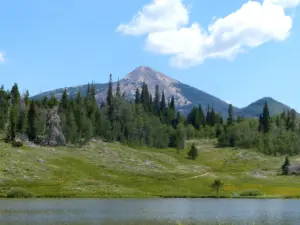
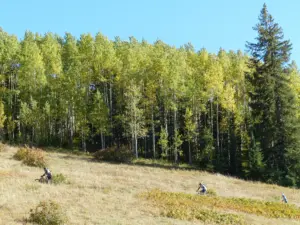
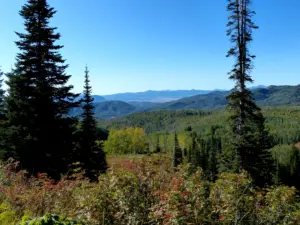

Here is the letter from Routt County Commissioners; June 19, 2025.
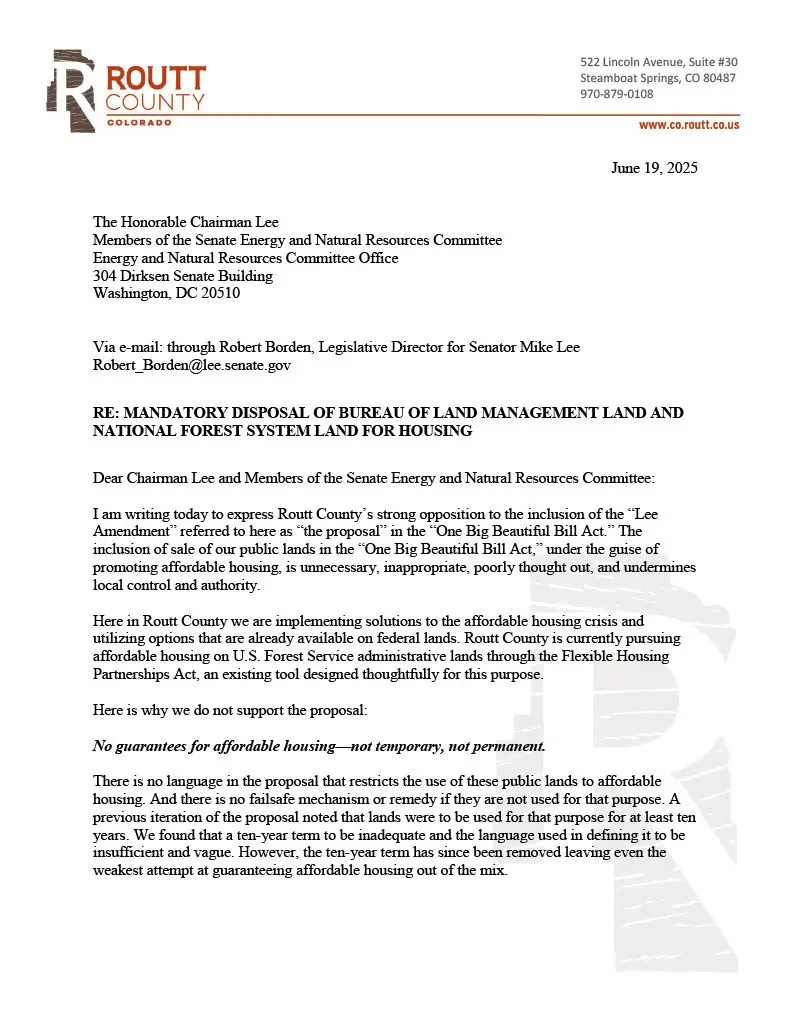
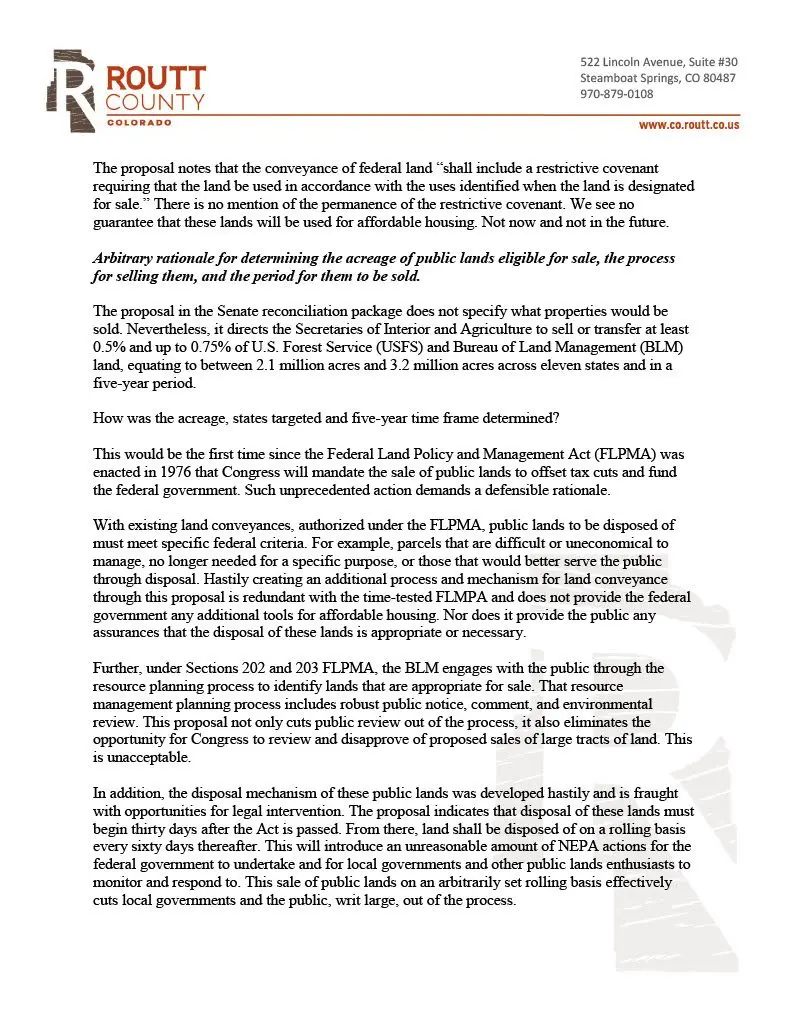
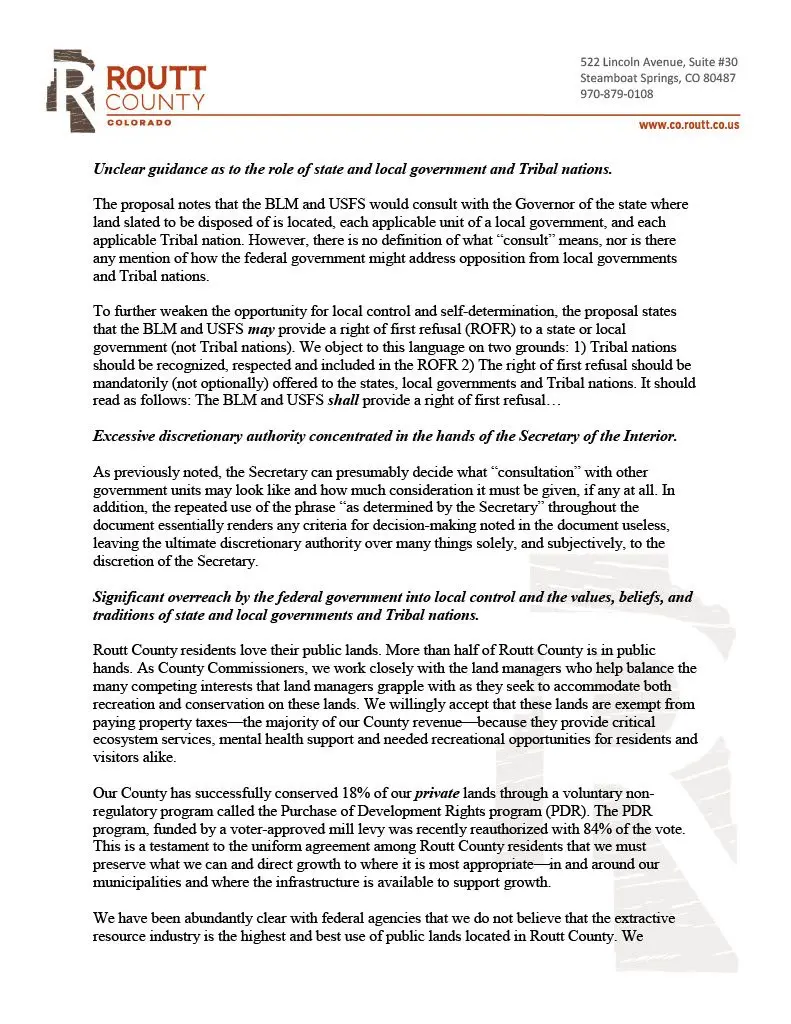
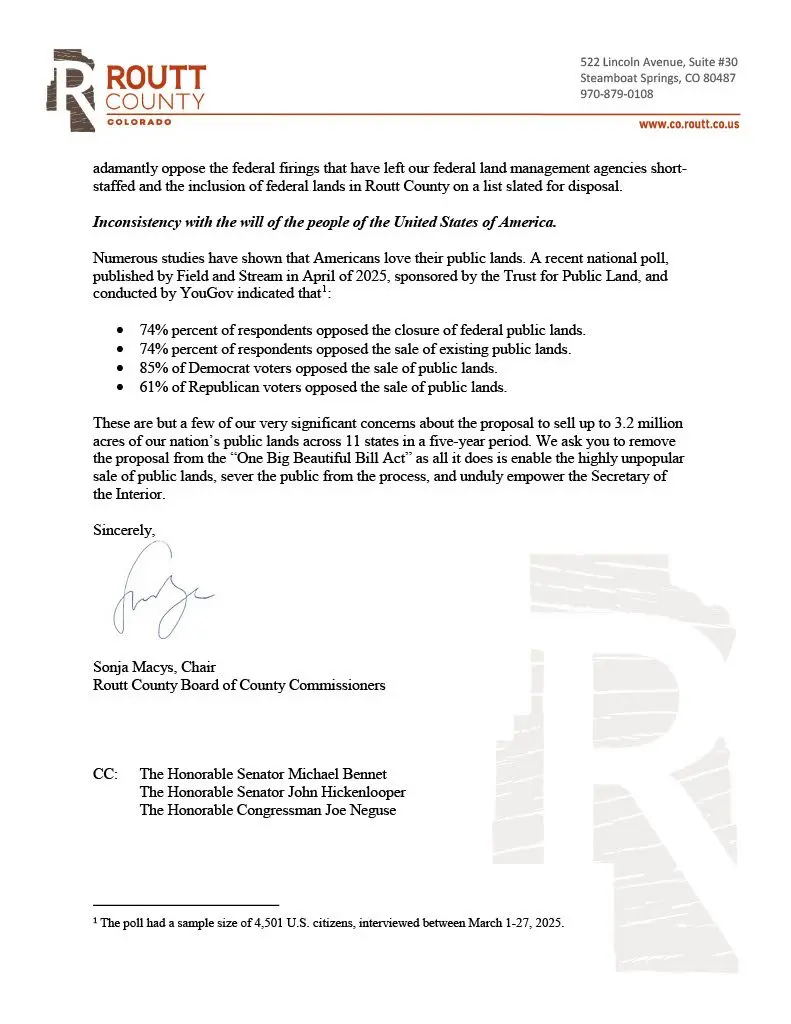
June 19, 2025
The Honorable Chairman Lee
Members of the Senate Energy and Natural Resources Committee
Energy and Natural Resources Committee Office
304 Dirksen Senate Building
Washington, DC 20510
Via e-mail: through Robert Borden, Legislative Director for Senator Mike Lee Robert_Borden@lee.senate.gov
RE: MANDATORY DISPOSAL OF BUREAU OF LAND MANAGEMENT LAND AND NATIONAL FOREST SYSTEM LAND FOR HOUSING
Dear Chairman Lee and Members of the Senate Energy and Natural Resources Committee:
I am writing today to express Routt County’s strong opposition to the inclusion of the “Lee Amendment” referred to here as “the proposal” in the “One Big Beautiful Bill Act.” The inclusion of sale of our public lands in the “One Big Beautiful Bill Act,” under the guise of promoting affordable housing, is unnecessary, inappropriate, poorly thought out, and undermines local control and authority.
Here in Routt County we are implementing solutions to the affordable housing crisis and utilizing options that are already available on federal lands. Routt County is currently pursuing affordable housing on U.S. Forest Service administrative lands through the Flexible Housing Partnerships Act, an existing tool designed thoughtfully for this purpose.
Here is why we do not support the proposal:
No guarantees for affordable housing—not temporary, not permanent.
There is no language in the proposal that restricts the use of these public lands to affordable housing. And there is no failsafe mechanism or remedy if they are not used for that purpose. A previous iteration of the proposal noted that lands were to be used for that purpose for at least ten years. We found that a ten-year term to be inadequate and the language used in defining it to be insufficient and vague. However, the ten-year term has since been removed leaving even the weakest attempt at guaranteeing affordable housing out of the mix.
The proposal notes that the conveyance of federal land “shall include a restrictive covenant requiring that the land be used in accordance with the uses identified when the land is designated for sale.” There is no mention of the permanence of the restrictive covenant. We see no guarantee that these lands will be used for affordable housing. Not now and not in the future.
Arbitrary rationale for determining the acreage of public lands eligible for sale, the process for selling them and the period for them to be sold. The proposal in the Senate reconciliation package does not specify what properties would be sold.
Nevertheless, it directs the Secretaries of Interior and Agriculture to sell or transfer at least 0.5% and up to 0.75% of U.S. Forest Service (USFS) and Bureau of Land Management (BLM) land, equating to between 2.1 million acres and 3.2 million acres across 11 states and in a fiveyear period.
How was the acreage, states targeted and five-year time frame determined?
This would be the first time since the Federal Land Policy and Management Act (FLPMA) was enacted in 1976 that Congress will mandate the sale of public lands to offset tax cuts and fund the federal government. Such unprecedented action demands a defensible rationale.
With existing land conveyances, authorized under the FLPMA, public lands to be disposed of must meet specific federal criteria. For example, parcels that are difficult or uneconomical to manage, no longer needed for a specific purpose, or those that would better serve the public through disposal. Hastily creating an additional process and mechanism for land conveyance through this proposal is redundant with the time-tested FLMPA and does not provide the federal government any additional tools for affordable housing. Nor does it provide the public any assurances that the disposal of these lands is appropriate or necessary.
Further, under Sections 202 and 203 FLPMA, the BLM engages with the public through the resource planning process to identify lands that are appropriate for sale. That resource management planning process includes robust public notice and comment and environmental review. This proposal not only cuts public review out of the process, it also eliminates the opportunity for Congress to review and disapprove of proposed sales of large tracts of land. This is unacceptable.
In addition, the disposal mechanism of these public lands was developed hastily and is fraught with opportunities for legal intervention. The proposal indicates that disposal of these lands must begin thirty days after the Act is passed. From there, land shall be disposed of on a rolling basis every sixty days thereafter. This will introduce an unreasonable amount of NEPA actions for the federal government to undertake and for local governments and other public lands enthusiasts to monitor and respond to. This sale of public lands on an arbitrarily set rolling basis effectively cuts local governments and the public, writ large, out of the process.
Unclear guidance as to the role of state and local government and Tribal nations.
The proposal notes that the BLM and USFS would consult with the Governor of the state where land slated to be disposed of is located, each applicable unit of a local government, and each applicable Tribal nation. However, there is no definition of what “consult” means, nor is there any mention of how the federal government might address opposition from local governments and Tribal nations.
To further weaken the opportunity for local control and self-determination, the proposal states that the BLM and USFS may provide a right of first refusal (ROFR) to a state or local government (not Tribal nations). We object to this language on two grounds: 1) Tribal nations should be recognized, respected and included in the ROFR 2) The right of first refusal should be mandatorily (not optionally) offered to the states, local governments and Tribal nations. It should read as follows: The BLM and USFS shall provide a right of first refusal…
Excessive discretionary authority concentrated in the hands of the Secretary of the Interior.
As previously noted, the Secretary can presumably decide what “consultation” with other government units may look like and how much consideration it must be given, if any at all. In addition, the repeated use of the phrase “as determined by the Secretary” throughout the document essentially renders any criteria for decision-making noted in the document useless, leaving the ultimate discretionary authority over many things solely, and subjectively, to the discretion of the Secretary.
Significant overreach by the federal government into local control and the values, beliefs and traditions of state and local governments and Tribal nations.
Routt County residents love their public lands. More than half of Routt County is in public hands. As County Commissioners, we work closely with the land managers who help balance the many competing interests that land managers grapple with as they seek to accommodate both recreation and conservation on these lands. We willingly accept that these lands are exempt from paying property taxes—the majority of our County revenue—because they provide critical ecosystem services, mental health support and needed recreational opportunities for residents and visitors alike.
Our County has successfully conserved 18% of our private lands through a voluntary nonregulatory program called the Purchase of Development Rights program (PDR). The PDR program, funded by a voter-approved mill levy was recently reauthorized with 84% of the vote. This is a testament to the uniform agreement among Routt County residents that we must preserve what we can and direct growth to where it is most appropriate—in and around our municipalities and where the infrastructure is available to support growth. We have been abundantly clear with federal agencies that we do not believe that the extractive resource industry is the highest and best use of public lands located in Routt County. We adamantly oppose the federal firings that have left our federal land management agencies shortstaffed and the inclusion of federal lands in Routt County on a list slated for disposal.
Inconsistency with the will of the people of the United States of America.
Numerous studies have shown that Americans love their public lands. A recent national poll, published by Field and Stream in April of 2025, sponsored by the Trust for Public Land, and conducted by YouGov indicated that:
- 74% percent of respondents opposed the closure of federal public lands.
- 74% percent of respondents opposed the sale of existing public lands.
- 85% of Democrat voters opposed the sale of public lands.
- 61% of Republican voters opposed the sale of public lands.
These are but a few of our very significant concerns about the proposal to sell up to 3.2 million acres of our nation’s public lands across 11 states in a five-year period. We ask you to remove the proposal from the “One Big Beautiful Bill Act” as all is does is enable the highly unpopular sale of public lands, sever the public from the process and unduly empower the Secretary of the Interior.
Sincerely, Sonja Macys, Chair Routt County Board of County Commissioners
CC: The Honorable Senator Michael Bennet The Honorable Senator John Hickenlooper The Honorable Congressman Joe Neguse
1The poll had a sample size of 4,501 U.S. citizens, interviewed between March 1-27, 2025.